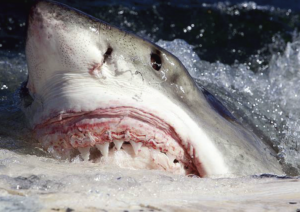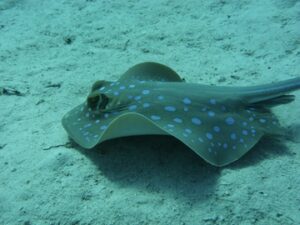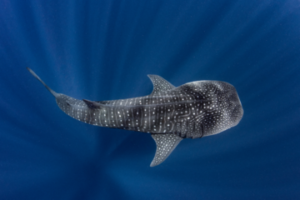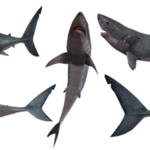Sharks are versatile creatures, and although they might seem to be after prey all the time to eat, there are many layers to the perception. Sharks and their eating habit are a fascinating area to be analyzed.
Sharks have been known to go for up to eight weeks without eating. That’s a long time indeed! However, the longest time a shark remained without food has been recorded as 15 months in the case of a Swell shark. The most surprising truth is that the longer they go without food, the more active their hunting abilities become. So, a hungry shark is a skilled predator!
Every organism on the planet has been designed in such a way that it will not die if its food supply is cut off. Each of them can go without meals for a period, which varies depending on a variety of circumstances.
In this post, our focus will be on analyzing every fact related to sharks’ ability to last without food.
Are sharks always hungry?
Most sharks are predators, and we usually see them after their prey. So can this tendency of theirs be connected with their hunger? In other words, are sharks always hungry?
A shark does not stay hungry all of the time, though they do go through what is known as an “eating phase,” which could be interpreted as the hungry phase. That said, sharks go through several feeding cycles, including latent eating patterns, which means they go weeks without eating.

However, after a long period of hunger, these fish enter a regular eating cycle in which they actively look for food. Yet, in the case of sharks, this is not a constant phenomenon.
As a result, it’s safe to assume that if you observe a shark pursue another creature, it’s not always a sign that it’s looking for food.
How often do sharks need to eat?
A shark is not a constant eater. That said, it is interesting to explore how often these fish need to satisfy their hunger?
Sharks eat 1 or 2 two meals a week and mostly hunt during dusk and dawn. Keeping this in mind, it’s best to avoid swimming in shark-prone locations during dawn and twilight to reduce your chances of being attacked by a shark.
Remember, although it is a prevalent perception that if it is a shark, it will attack its prey, which is almost true. But these fish mostly attack out of curiosity than hunger.

How can sharks go so long without eating?
While humans require at least three meals every day, sharks can endure weeks without eating. How can they do so? Let’s dig into the facts.
Sharks can go for lengthy periods without consuming food because they are cold-blooded. To put it another way, sharks do not expend all of their energy swimming or hunting. Sharks, in fact, are among the organisms with the slowest metabolism rates. These fish also rely on the oil accumulated in their liver after they feed on their prey to survive.
What is sharks’ favorite food?
Sharks are apex predators and they are amongst the most selective hunters in the ocean. Also, while these fish are carnivorous, their diet may vary heavily. Let’s have a look.

Sharks exist in a range of shapes and sizes, therefore their diet will vary based on their size and where it lives. Sharks eat a variety of foods, including the ones listed below.
Small Fish
One of the favorite foods of sharks is small fish. Sharks commonly hunt the following types of fish:
- Salmon
- Redfish
- Tuna
- Bass
- Seals
Sharks’ favorite prey are seals. Large sharks, such as great whites, are frequently seen hunting and devouring seals as their major meal. If sharks eat a plump, fully developed seal, they can go for a week without eating.
Sea Lions
Sea lions, like seals, make excellent prey for sharks. Sea lions are easy prey for larger sharks, and these predators can go days without eating after devouring a fully grown sea lion.
Other Sharks
Larger sharks tend to eat smaller sharks. A tiger shark, for example, may consume a bull shark, whereas a blacktip shark may eat a dogfish shark. That said, grown-up sharks may hunt and consume baby sharks as well. In the marine world, “shark-eating shark” is a common scenario.
Stingrays
Stingrays need a special mention because these are the favorite prey for hammerhead and great hammerhead sharks.
Crustaceans
Crustaceans are the preferred food of bottom-dwelling sharks. Crabs, shellfish, lobsters, and other crustaceans can be found in large numbers at the ocean’s bottom. As a result, bottom-dwelling sharks have a good chance of catching these prey.
Plankton
Sharks that eat planktons, including basking sharks whale sharks, and megamouth sharks, are filter feeders. These sharks filter large amounts of water through their teeth/ filter-pads to separate plankton from the water, which then acts as their food.
How much food do sharks need to eat to survive?
Because sharks come in all sorts of sizes, the quantity of food they eat varies as well. To survive, not all sharks consume the same amount of food.
Sharks eat between 0.5 percent and 3% of their entire body mass each time they dine. When we compare sharks’ food consumption to that of humans, who consume roughly 2% of their body weight each day, this proportion becomes clearer.
It’s also worth mentioning that, unlike humans, sharks don’t feel compelled to eat every day. Because they can’t chew their food correctly and need extra time to digest it, these fish only hunt every 1- 2 days.
Do sharks like eating humans?
Because shark attacks on humans are not uncommon, there is a widespread belief that these fish enjoy the taste of humans. Is there, however, any truth to this?
Humans are unappealing to sharks. Humans, according to many scientists, are not included as a part of a shark’s typical diet. Sharks respond to the smell of seals, but not humans, according to studies.
However, the difficulty with sharks is that they are extremely curious. As a result, while scouting for suitable prey, they may come across humans and bite. Just to see whether it works for them!
How long can a great white shark go without eating?
Great white sharks are among the ocean’s most active predators. They are opportunistic feeders. But how long can they survive if they don’t get any food?
The duration a great white shark can spend without eating is a subject of debate. Nonetheless, it has been found that if it consumes a large fatty prey (like a mammal), it can go for a month and a half without eating.
How long can a whale shark go without eating?

Whale sharks are the largest fish species on the planet. Hence, its food consumption needs are higher. But how long can these sharks survive without food?
Whale sharks can go for up to four months without eating. This is an incredible amount of time, which these fish can achieve because they don’t consume while moving. Whale sharks gorge themselves on food when it’s plentiful, making it easier for them to survive dry spells.
How much food would a megalodon need to stay alive?
Megalodons were the largest sharks that ever existed on earth. In comparison to modern-day sharks, including the largest whale sharks, their food was also massive.
According to experts, a megalodon is required to consume 2,500 lbs of food each day during its lifetime. When compared to humans’ diet, it’s the equivalent of eating 3200 cans of tuna fish per day.
Megalodons were accustomed to warmer temperatures and required a large number of marine mammals to feed on. One of the main causes of megalodon extinction could be climate change that had left these sharks with insufficient food.
Summary
Sharks are the ocean’s formidable predators. These fish, however, do not require frequent feeding to maintain their stature. Sharks can also go without food for long periods. These fish can do so because they either consume larger prey or a great quantity of smaller food, allowing them to stay full for longer periods.




